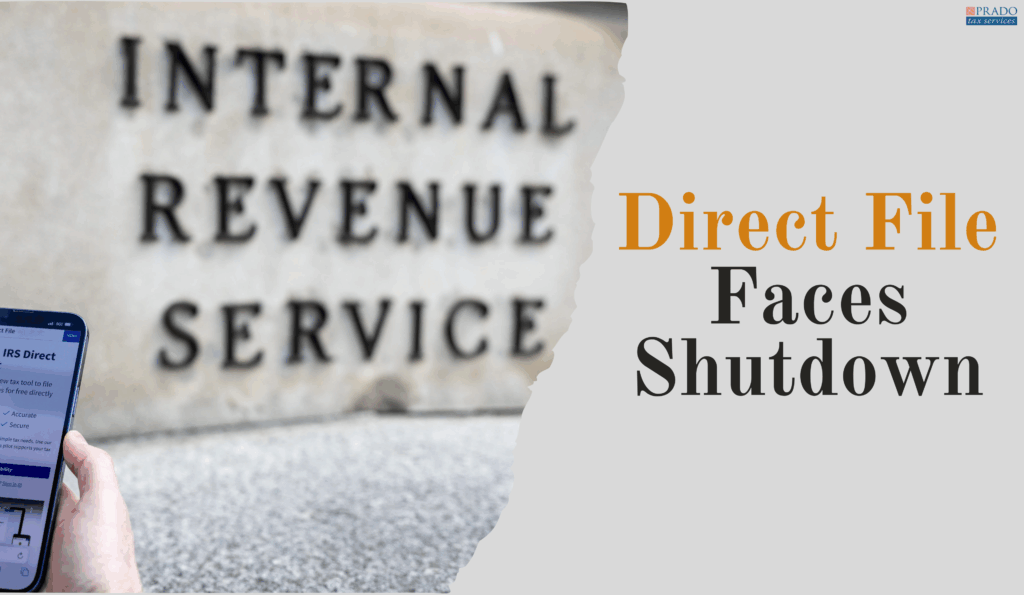Introduction: Why This News Matters to You
The IRS Direct File program, which allowed eligible taxpayers to file federal tax returns online for free through the IRS website, is now facing termination. According to IRS Commissioner Danny Werfel, the agency plans to end the program after recent pilot testing.
For taxpayers who used Direct File in the 2024 or 2025 tax season, this raises important questions. Will it still be available next year? What alternatives exist? How will this affect filing costs and access to support?
This article explains what the Direct File program was, why it may be shut down, what this means for individual and small business taxpayers, and how Prado Tax Services can help you adapt.
What Was the IRS Direct File Program?
The IRS Direct File program was a free, government-run online tool that allowed eligible taxpayers to prepare and file their federal tax returns directly with the IRS. It was introduced as a pilot in the 2024 tax season and expanded in 2025 to 12 states, including California, Texas, and New York.
IRS Direct File was designed for simple returns. It supported W-2 income, standard deductions, and a limited set of tax credits. It did not handle business income, itemized deductions, or more complex tax situations.
The IRS Direct File program aimed to provide a no-cost, easy-to-use alternative to commercial tax software. Unlike private tools that often market themselves as free but include hidden upsells or limited eligibility, Direct File was entirely free to use for qualified filers.
Despite high user satisfaction and positive feedback, the IRS Direct File program faced resistance from commercial tax prep companies and some lawmakers. That resistance has now led to active efforts to shut it down, as confirmed in recent reports.
Is the IRS Direct File Ending?
While the IRS has not yet issued a formal press release confirming the program’s shutdown, recent statements from top officials and legislative actions suggest it is likely. In the same CNBC interview, IRS Commissioner Danny Werfel stated that the agency plans to discontinue the IRS Direct File program, citing sustainability and funding concerns.
The move aligns with legislative efforts to cut the IRS Direct File program entirely. A proposal backed by former President Trump and House Republicans, known as the “Big Beautiful Bill,” seeks to defund and permanently eliminate the IRS Direct File system. The bill reflects long-standing pressure from the commercial tax software industry, which views IRS Direct File as a threat to its business model during tax season.
Although the IRS Direct File program is still technically available for the 2025 tax season, the expectation is that it will not return for 2026 unless new funding or political support emerges. The lack of an official IRS shutdown notice creates some confusion, but multiple independent sources, including The Daily Dot, report that the end of the program is effectively already in motion.
For taxpayers, this uncertainty means it is important to prepare for the possibility that free, direct federal filing through the IRS Direct File program will not be an option much longer during tax season.
Why Is Direct File Being Shut Down?
The push to end the IRS Direct File program is driven by a mix of political and industry influence. Supporters of its termination argue that the program is a duplication of services already available through the IRS Free File Alliance, a public-private partnership with commercial tax software providers. However, critics note that Free File has historically low usage rates and has faced criticism for hidden costs and eligibility restrictions during tax season.
The primary political force behind the shutdown is the “Big Beautiful Bill,” a Republican-backed legislative proposal that aims to defund Direct File. As reported by Americans for Tax Fairness, the bill is heavily supported by commercial tax prep companies that view the IRS program as direct competition.
These companies have spent millions lobbying against IRS-developed filing tools. They argue that public tax software harms the private market. Advocates of IRS Direct File counter that it offered a genuinely free and transparent option for taxpayers, especially low-income filers during tax season.
Despite strong user satisfaction and efficiency in its pilot runs, political and corporate pressure appears to have outweighed public interest.
How This Impacts Individual and Small Business Taxpayers
The end of the IRS Direct File program will primarily affect taxpayers who previously relied on free, government-backed filing. Individuals with simple returns will now be forced to use commercial software, which may appear free but often includes hidden fees or eligibility limits during tax season. This change increases the risk of overpaying or making filing errors without expert support.

For small business owners and self-employed professionals, the impact is even greater. IRS Direct File never supported business income or more complex deductions, so those users already needed professional help. With the elimination of this program, the messaging is clear: taxpayers are on their own during tax season unless they turn to experienced preparers.
This shift may disproportionately affect lower-income filers, first-time taxpayers, and non-English speakers who lack access to reliable software or guidance. Many of these individuals will now look to trusted, local professionals for accurate and affordable tax filing services during tax season.
How Prado Tax Services Can Help You Navigate This Change
With the IRS Direct File program on its way out, many taxpayers will be looking for trustworthy, affordable filing options. Prado Tax Services provides professional tax preparation for both individuals and small businesses, ensuring every return is accurate, complete, and maximizes legal deductions.
Whether your return is simple or complex, Prado offers guidance tailored to your situation. If you are unsure how this IRS Direct File policy change affects you, or if you’ve received follow-up letters or notices during tax season, Prado also helps with navigating IRS or FTB notices.
From tax filing to post-filing support, Prado Tax Services gives you confidence and clarity.
Final Thoughts: Stay Informed, Stay Ahead
The planned end of the IRS Direct File program marks a shift in how Americans access tax filing resources. For many, it means returning to commercial software or seeking professional help. Staying informed now can prevent confusion and added costs later. If navigating these changes feels overwhelming or you want clarity on your next steps, working with trusted professionals like Prado Tax Services can make all the difference. Whether it’s filing accurately, planning ahead, or handling post-filing questions, we’re here to help. Contact us to get the expert guidance you need to stay ahead with confidence.
If you’re unsure where to turn, take time to learn how to choose the best tax preparer in the Bay Area. Making the right choice today can lead to fewer surprises during next year’s tax season.

